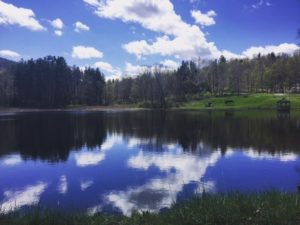We are excited that Eisner Camp has been chosen to participate in a selective pilot program to expand our mindfulness activities at camp. Three Eisner summer staff and three full-time staff members are participating in the Institute for Jewish Spirituality’s new mindfulness initiative. This three-year pilot program includes three Jewish overnight camps and three Jewish day schools. Eisner Camp hosted the program’s first retreat right after Thanksgiving. Our participants will be sharing their reflections on the program over the next several months. Read below for a reflection from our Director of Development, Corey Cutler:
“A rose by any other name would still smell as sweet.” This famous quote from William Shakespeare’s Romeo and Juliet is what stands out for me after the 5-day mindfulness retreat at Eisner Camp I experienced thanks to the Institute for Jewish Spirituality. What resonates for me about this line, although slightly out of context from the play, is the notion of noticing particular fragrances – or in my case, flavors.
On this retreat, much of our time and two-thirds of our daily meals were conducted in silence, allowing each participant to truly be present in the moment with the experience of whatever it was  we were doing at that time. At first, I found it quite insufferable, especially at mealtimes, when we were seated with both friends and strangers. The temptation to speak cordially or even to politely request something from the opposite side of the table was overwhelming. I kept picturing Gene Wilder in the film The Frisco Kid, when he and Harrison Ford are sharing a meal at a monastery and the Gene Wilder character calls out for salt. (If you are not familiar with this scene or movie, I highly recommend it.) As the retreat moved along and we meditated and did yoga and studied, I found greater comfort with spending time and space in my own head. I started to see things around my summer home that I had not noticed before – patterns and shapes emerging in nature, landscapes that burst through the leafless trees that are not present in the summer, sensations of the wind brushing my face, all experiences that were new for me in a place where I have spent countless hours.
we were doing at that time. At first, I found it quite insufferable, especially at mealtimes, when we were seated with both friends and strangers. The temptation to speak cordially or even to politely request something from the opposite side of the table was overwhelming. I kept picturing Gene Wilder in the film The Frisco Kid, when he and Harrison Ford are sharing a meal at a monastery and the Gene Wilder character calls out for salt. (If you are not familiar with this scene or movie, I highly recommend it.) As the retreat moved along and we meditated and did yoga and studied, I found greater comfort with spending time and space in my own head. I started to see things around my summer home that I had not noticed before – patterns and shapes emerging in nature, landscapes that burst through the leafless trees that are not present in the summer, sensations of the wind brushing my face, all experiences that were new for me in a place where I have spent countless hours.
Of particular note for me was an experience I had at our final meal together. Breakfast on the final day was once again silent, and as such, I set my intention to focus on the flavors of the bounty that was provided. On this day, the breakfast bar had a fresh vegetable frittata with broccoli, mushrooms, and cheese that excited my taste buds. At most meals I eat in the Chadar Ochel (camp’s dining room), there are hundreds of other people dining at a feverish pitch. Somehow, time moves forward at a quickened pace, such that by the end of the meal, I have barely chewed my food let alone tasted it. But not this day, not at this meal. That day, I had nothing but time and silence to lean back and savor every bite. As I cut into the frittata and began to chew my first forkful, I noticed that the mushroom I was so excited about was not just any mushroom, it was a shiitake mushroom. Each bite was a burst full of delight. As I continued to dine on my frittata, I noticed that I had wandered upon another bite of mushroom. But to my surprise, this was not a shiitake mushroom as I had savored in my previous encounter. No, this was a Portobello mushroom. Wow, this was an entirely different experience; the texture, the flavor, the sensation. How cool! Well, I could hardly stand it. I felt like I just discovered the moon. I went back to the kitchen – I had to break my silence to ask the chef if my discovery was indeed correct. Lo and behold, it was. My goodness. Beyond the pride I felt in having correctly identifed the distinctions, the complete joy I felt in having relished in these two similar but very separate earthly delights was simply amazing. Who knew that mushrooms could ignite such pleasure?
Now, I know that I didn’t discover a new planet or stumble upon a cure for the common cold, but at that moment in time and space, I encountered something that, had I not been present, would have slipped past me like so many other meals in the Chadar Ochel.
My challenge for myself, and to everyone in our camp community, whether it is a meal at camp this summer or a family dinner in your home, is to notice what you are eating: break your old habits and truly recognize what has been prepared for you. The meal you eat is not just food that landed there, it was provided for you with love and kindness and will nourish and sustain you. Do not rush through the experience of eating your food, relish it, enjoy it, and when you are finished, thank God for what you have received.
And if you are so inspired, to paraphrase one of the English interpretations of Birkat Hamazon (grace after the meal) I read on the retreat, “take the nourishment you have just received and impart dignity wherever you partake.” After all, couldn’t we all use a little more dignity in this world?
